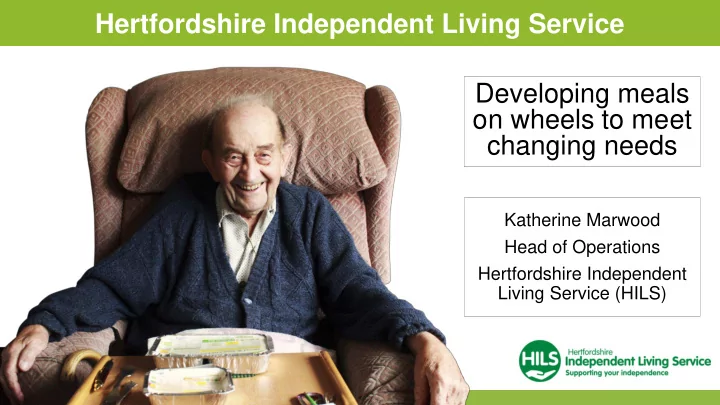

Hertfordshire Independent Living Service Developing meals on wheels to meet changing needs Katherine Marwood Head of Operations Hertfordshire Independent Living Service (HILS)
Agenda • Who we are • What we do • Our growth • Our challenges • Our approach • Our success • Our future
From small beginnings… • Est. 2007 • 7 staff • 200 clients • 2 vehicles • 1 site • 5 days a week
… to today • 200 staff • 5,000 clients • 500,000 meals • 67 vehicles • 5 units across 4 sites • 7 days a week • 365 days a year
Challenges Initial: • Corporate structure • Charitable or social objectives • Contracts, cash flow, VAT • Governance • TUPE; culture • Early crisis Ongoing: • 365 day operations • Capacity < need • Image & communication • Health and social care silos • Economic / political environment
Positive outcomes Every £1 invested in HILS’ 97% feel meal service generates more 87% feel independent healthier £5.28 of social value 84% feel 93% feel less happier lonely 76% visit 80% their GP recovered less more quickly from illness or 92% feel difficulty better nourished 97% say 88% worry family have less about greater peace injury of mind
More than just meals 11,000 clients
Becoming a diverse and sustainable business A person’s A business’ wellbeing: wellbeing • Common objectives Social • Common purpose • Common assets Psychological Health
Our approach to nutrition & wider wellbeing • Identify and address the causes of malnutrition • Menu development • Bespoke menus • Training and development • Nutrition & wellbeing checks
Nutrition & wellbeing checks Use of national tools e.g. MUST Consider swallow issues and texture needs Eating patterns Mental health issues Finance concerns Loneliness and isolation Memory concerns Support Mobility and falls Hearing and eyesight Hydration Continence concerns
Success factors • Values: right people • Culture: honesty and integrity • Relationships - partners • Adaptive model • Innovation; experimentation • Cross-utilise assets and financial/human resources • Hard work breeds success • Passion to change the world
What next? • Measure our outcomes • Demonstrate the impact of prevention • Expand our services and income streams • Diversify what we offer • Re-model to meet local need
What next? • Challenge assumptions • Develop long term solutions • Work across boundaries • Ensure that services are adapting
Conclusions • Become indispensable • Do things better • Challenge the status quo • Change the world
www.hertsindependentliving.org Any questions?
Recommend
More recommend